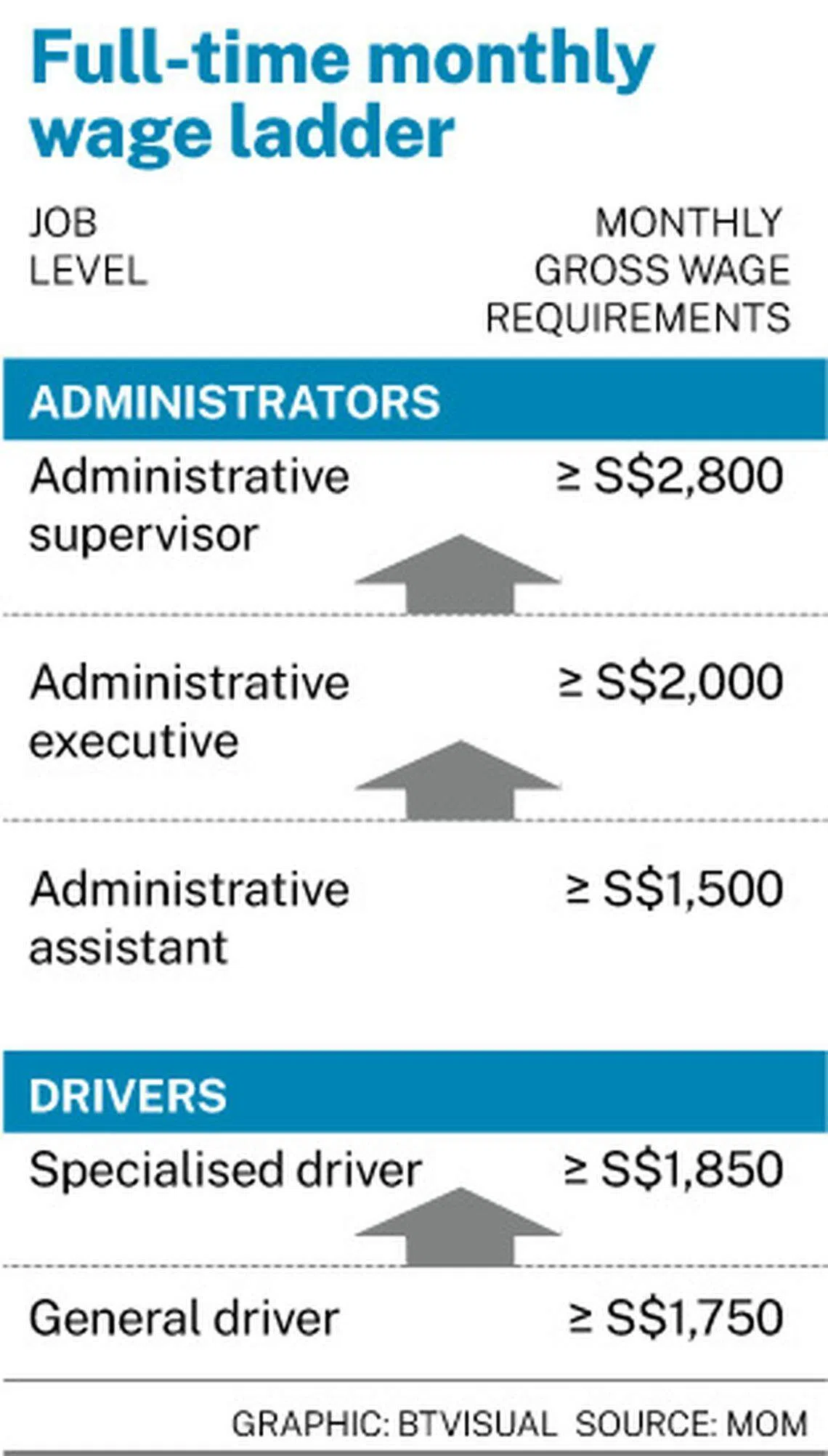Pay hikes for 5,000 drivers, 32,000 admin staff under new progressive wage move

Elysia Tan
ABOUT 5,000 full-time drivers and 32,000 full-time administrators will see pay rises under Occupational Progressive Wages (OPW) that take effect on Mar 1, the Ministry of Manpower said on Tuesday (Feb 21).
They are among 56,000 full-time lower-wage workers – defined as those with salaries in the bottom fifth of the resident workforce – covered by the previously announced OPW. The OPW, which is for Singaporean citizens and permanent residents, covers a total of 195,000 full-time and part-time administrators and drivers.
Unlike sectoral Progressive Wage Models (PWMs), the OPW applies to workers in specific occupations across all sectors. It sets out wage requirements for various job levels. For example, administrative assistants should be paid at least S$1,500 a month, while administrative executives should be paid at least S$2,000.
General drivers, who operate vehicles on a Class 3 licence or below, must be paid at least S$1,750 a month. Specialised drivers must be paid at least S$1,850. These include drivers of vehicles requiring a Class 4 licence and above, such as lorries and buses, as well as other specialised roles such as chauffeurs.
Workers’ pay will rise along a wage ladder, alongside career progression and training.

For part-time OPW employees, there are hourly gross wage requirements. For instance, administrative assistants should be paid at least S$9 an hour, while general drivers should be paid at least S$9.18 an hour.
Navigate Asia in
a new global order
Get the insights delivered to your inbox.
The introduction of wage requirements from Mar 1 is the first step in the OPW, said Senior Minister of State for Manpower Zaqy Mohamad told media during a company visit to Bok Seng Logistics on Tuesday.
Further steps may be considered after assessing the implementation and impact of this first move, he added. These might include yearly increments as part of a three- or five-year plan, as seen in some sectoral PWMs.
“This is the first time that we’re implementing it this way … cutting across companies, sectors, in the horizontal way,” he said. “And therefore, we want to make sure that we don’t put in a plan that we cannot execute.”
Besides wage requirements, there are also OPW training requirements. Employers must ensure that their resident drivers or administrators complete at least one Workforce Skills Qualifications module or in-house training programme.
Additional wage requirements apply for full-time workers who work more than 44 hours a week and are covered by Part IV of the Employment Act, which provides for rest days, hours of work and other conditions of service for select employees.
The OPW was developed by representatives from tripartite groups – unions, employers and government – and is not mandated by law.
However, employers of administrators and drivers must comply with OPW requirements if they want to apply for new work passes or renew existing work passes.
Because of the cross-industry nature of the OPW, some employers and staff may not know that it applies to them, said Zaqy. This is especially true for smaller companies that may not have human resource management functions to identify these job roles, he added.
To give employers time to adjust and comply, there will be an initial six-month “run-in” period till August, during which they will not be penalised for non-compliance.
The National Trades Union Congress, together with its tripartite partners, will also continue to reach out to raise workers’ understanding of the benefits owed to them, said Mohd Fahmi Aliman, director of its Operation and Mobilisation Division Secretariat.
At logistics services provider Bok Seng Logistics, workers’ wages are already above minimum mandated levels, said senior director Tan Boon Poh.
This is even before it began implementing training and wage raises last year. To date, about 30 per cent of its total workforce have already benefited from these moves, Tan said, adding that these upgrading efforts are ongoing.
While this is the first OPW to take effect, it is the latest measure in a suite of progressive wage moves for lower-wage workers, including sectoral PWMs in industries such as security and retail. The food services PWM will also take effect from Mar 1, followed by the waste management PWM this July.
Decoding Asia newsletter: your guide to navigating Asia in a new global order. Sign up here to get Decoding Asia newsletter. Delivered to your inbox. Free.
Copyright SPH Media. All rights reserved.



